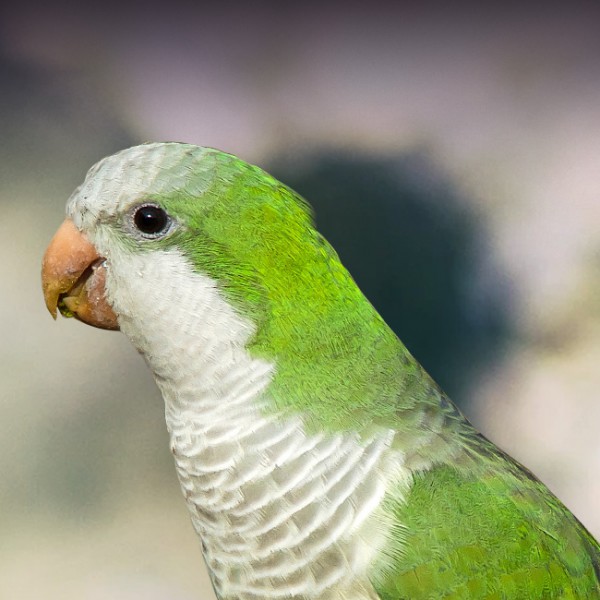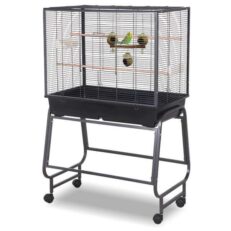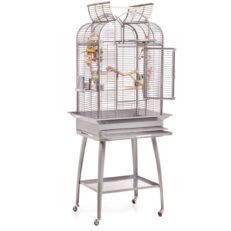
“Quaker Parrots, often referred to as Monk Parakeets, are a distinct species of petite, vibrant green parrots hailing from the lush regions of South America. They are famed for their exuberant, sociable personalities, which has contributed to their rising popularity as household pets across the globe. Learning about these remarkable creatures, via the ’10 Surprising and Fascinating Facts about Quaker Parrots’ detailed below, can prove to be an invaluable resource. These insights can assist potential parrot parents in making well-informed decisions regarding their care, whilst providing existing owners with an enhanced understanding and deeper appreciation of their feathered companions.
So, it’s time to immerse ourselves in the captivating world of Quaker Parrots, as we unravel some truly fascinating facts about these unique birds!
Fact 1: Quaker Parrots Carry the Moniker of Monk Parakeets
Quaker Parrots hold an interesting alternate title of ‘Monk Parakeets’. This name originates from their community-centric lifestyle and propensity to build shared nests, closely mirroring the communal life led by monks within monasteries. Yet, the term ‘Quaker Parrots’ has gained considerable popularity and is commonly used in reference to these birds, owing to their unique quaking or trembling motions.
Standing apart from the rest of the parrot kingdom, Quaker Parrots are distinguished not just by their appearance but also their behaviour and vocal attributes. Their innate social tendencies coupled with their remarkable ability to mimic an array of sounds further add to their unique charm, setting them apart from their avian counterparts
Fact 2: Quaker Parrots Exhibit Exceptional Intelligence and Sociability
Renowned for their remarkable intellect and sociability, Quaker Parrots have become a favored choice of pets amongst individuals and families. Their intellectual capabilities stretch far and wide, equipping them with the ability to problem-solve, utilise tools, and learn a variety of tricks and commands. This high level of intelligence, paired with their social inclinations, allows them to form deep bonds and provide a sense of companionship to their human counterparts.
As social beings, Quaker Parrots revel in interaction, both with their owners and other birds. They find pleasure in playful activities involving toys, enjoy the soothing sensation of petting, and cherish the time spent with their owners. A fascinating aspect of their social nature is their ability to mimic sounds, inclusive of human speech, making them an engaging and entertaining companion.
Fact 3: Quaker Parrots Hail from South America
Originating from South America, Quaker Parrots are native to several countries including Argentina, Brazil, and Uruguay. In these wild habitats, they tend to form large flocks and construct shared nests in trees or on power poles. Their indigenous surroundings are typically characterized by warm temperatures and an abundant food supply, comprising seeds, fruits, and varied vegetation.
While their roots lie in South America, the allure of Quaker Parrots has spread globally due to their distinct intelligence, social tendencies, and remarkable adaptability to various climates. Contrary to their warm native climate, these birds have shown great resilience in adapting to colder temperatures, demonstrating their versatility and capacity to thrive in a range of climatic conditions.
Fact 4: Quaker Parrots Enjoy a Lengthy Lifespan
Quaker Parrots are known for their impressive longevity, often living for an average of 20 to 30 years or even more in captivity. This extended lifespan makes them an appealing choice for individuals and families seeking a long-term avian companion.
Numerous factors can influence the lifespan of Quaker Parrots, including their diet, exercise regimen, and overall health. A well-balanced diet that provides essential nutrients while maintaining a low-fat content can contribute to their longevity. Regular exercise and playtime are crucial in preventing obesity and other associated health issues. Moreover, routine veterinary check-ups play a vital role in identifying and addressing any potential health concerns before they escalate into more serious problems.
Fact 5: Quaker Parrots Possess Impressive Mimicking Skills
Quaker Parrots are renowned for their exceptional ability to mimic a wide array of sounds, making them truly captivating and interactive pets. They possess a natural talent for replicating human speech, as well as various household noises, melodies, and even the sounds of other animals.
These birds have a strong innate desire to communicate and often adopt and repeat sounds they are regularly exposed to. As a result, they can develop an extensive vocabulary of recognizable words and phrases, providing endless entertainment and engagement.
To encourage and nurture the mimicking behavior in your Quaker Parrot, it is crucial to prioritize regular socialization and interaction. Engage in conversations, sing to them, and introduce games that promote vocalization. Consistently repeating specific words and phrases can also help reinforce their mimicking abilities, ensuring hours of delightful interaction with your avian companion.
Fact 6: Quaker Parrots Thrive on Playfulness and Active Engagement
Quaker Parrots are celebrated for their playful nature and abundant energy. These curious and inquisitive birds take delight in exploring their surroundings and engaging in play with various toys. Not only does their playfulness provide entertainment for their owners, but it also offers numerous benefits for the birds themselves, including physical and mental stimulation, stress reduction, and overall enhanced health and well-being.
To ensure your Quaker Parrot receives ample opportunities for play and exercise, it is essential to create a spacious living environment enriched with a diverse range of toys and play items. Consider incorporating perches, swings, and climbing toys to cater to their energetic nature. Interactive toys, such as puzzles and treat-dispensing toys, can provide mental stimulation and engagement. Furthermore, regular out-of-cage playtime allows them to stretch their wings, explore their surroundings, and satisfy their inherent need for activity.
Fact 7: Quaker Parrots Show Nest-Building Behavior
Quaker Parrots display a unique nesting behavior that sets them apart from other parrot species. These intelligent birds are known for their ability to construct nests, creating special spaces for sleeping, resting, and raising their offspring.
There are two primary types of nests that Quaker Parrots build: tree nests and man-made nests. In their natural habitats, Quaker Parrots build tree nests, crafting sturdy structures using sticks and twigs. These tree nests can be observed in the branches of trees in their native regions of South America. For Quaker Parrots kept as pets, they often construct nests within their cages or aviaries. These man-made nests vary in complexity, ranging from simple twig structures to more elaborate, multi-chambered designs.
Providing a suitable nesting environment is crucial for the well-being of your Quaker Parrot. This includes ensuring they have a spacious cage or aviary and offering a variety of perches and hiding places for nest building. Additionally, providing materials such as twigs, sticks, and soft bedding can encourage their natural nest-building instincts and provide them with the necessary materials for construction.
Fact 8: Quaker Parrots Have an Omnivorous Diet
Quaker Parrots are versatile eaters with an omnivorous diet, meaning they consume both plant-based and animal-based foods. In the wild, their diet primarily consists of a variety of seeds, fruits, vegetables, and insects. They have even been observed eating small vertebrates like birds and lizards.
When caring for Quaker Parrots as pets, it is essential to provide a well-balanced diet that closely resembles their natural food sources. This can be achieved by offering a mix of high-quality seed blends, fresh fruits and vegetables, and commercially-available pellets specially formulated for parrots. Recommended fruits and vegetables include apples, carrots, spinach, and peas, while a good seed blend should include a variety of grains, nuts, and seeds.
It is crucial to limit the consumption of fatty or sugary treats, as these can lead to weight gain and other health issues. Instead, opt for healthy treat options such as unsalted nuts, dried fruit, or whole-grain crackers.
Additionally, ensuring your Quaker Parrot has access to fresh, clean water is vital for their overall health and well-being. Make sure to change the water daily to prevent contamination and dehydration.
Maintaining a balanced and nutritious diet is essential for the health and longevity of your Quaker Parrot.
Fact 9: Quaker Parrots Form Strong Bonds with Their Owners
Quaker Parrots are renowned for their ability to form deep and lasting bonds with their owners, making them wonderful companion pets. These intelligent and social birds have a natural affinity for human interaction and thrive on the companionship of their caregivers.
To nurture a strong bond with your Quaker Parrot, it is essential to dedicate quality time to them on a daily basis. Engage in interactive activities such as training sessions, playtime with toys, or simply spending time in each other’s company. These moments of connection not only strengthen the bond but also provide mental stimulation for your feathered friend.
Offering treats as rewards and allowing your Quaker Parrot to perch on your shoulder or nearby can further enhance the bond and create a sense of trust between you and your bird. Remember, each Quaker Parrot is unique in their preferences, so pay attention to their body language and responses to discover the activities they enjoy the most.
By investing time and effort into building a strong bond with your Quaker Parrot, you will not only foster a loving and enriching relationship but also ensure their overall well-being and happiness.
Fact 10: Quaker Parrots Are Protected by Law in Some Countries
Quaker Parrots, due to their unique qualities and status as a beloved pet species, are protected by laws in various countries, such as the United States, Australia, and parts of Europe. These legal protections aim to preserve the welfare of Quaker Parrots and ensure their conservation in the wild.
In these countries, capturing or trading Quaker Parrots from their natural habitats is strictly prohibited, as it disrupts their natural populations and habitats. Instead, regulations promote responsible ownership and the ethical sourcing of Quaker Parrots from reputable breeders or authorized sources.
It is crucial for potential owners to be aware of and adhere to these laws and regulations when considering Quaker Parrots as pets. Familiarize yourself with the specific laws in your country or region to ensure that you are in compliance and are providing the best care for your feathered companion.
CONCLUSION
Quaker Parrots, with their distinctive characteristics and endearing qualities, make captivating and cherished pets. By understanding these 10 amazing facts about Quaker Parrots, you can create a nurturing and fulfilling environment for your feathered friend. From their playful nature and intelligence to their social bonds and legal protections, Quaker Parrots bring joy and companionship to the lives of their owners. Embrace the wonders of these remarkable birds and embark on a rewarding journey of pet ownership.








